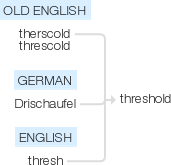Threshold
Old English therscold, threscold ; related to German dialect Drischaufel ; the first element is related to thresh (in a Germanic sense ‘tread’), but the origin of the second element is unknown.
wiktionary
From Middle English threschwolde, threscholde, from Old English þresċold, þerxold, þrexwold(“doorsill, entryway”), from Proto-Germanic *þreskudlaz, *þreskūþlijaz, *þreskwaþluz, from Proto-Germanic *þreskaną, *þreskwaną(“to thresh”), from Proto-Indo-European *terh₁-(“to rub, turn”). Cognate with Low German Drüssel(“threshold”), dialectal German Drischaufel, Drissufle, Trüschübel(“threshold”), Danish tærskel(“threshold”), Swedish tröskel(“threshold”), dialectal Swedish träskvald(“threshold”), Icelandic þröskuldur(“threshold”).
etymonline
threshold (n.)
Old English þrescold, þærscwold, þerxold, etc., "door-sill, point of entering," a word of uncertain origin and probably much altered by folk-etymology.
The first element probably is related to Old English þrescan (see thresh), either in its current sense of "thresh" or with its original sense of "to tread, trample." The second element has been much transformed in all the Germanic languages, suggesting its literal sense was lost even in ancient times. In English it probably has been altered to conform to hold.
Liberman (Oxford University Press blog, Feb. 11, 2015) revives an old theory that the second element is the Proto-Germanic instrumental suffix *-thlo and the original sense of threshold was a threshing area adjacent to the living area of a house. Cognates of the compound include Old Norse þreskjoldr, Swedish tröskel, Old High German driscufli, German dialectal drischaufel. The figurative use was present in Old English.
